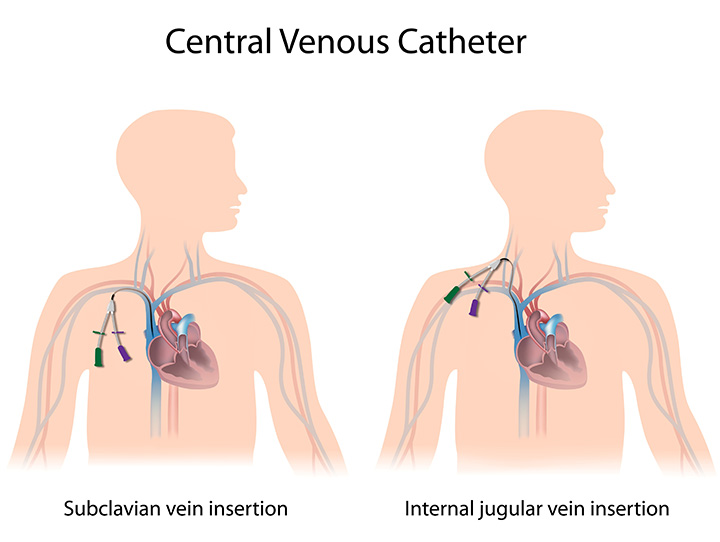What is a Tunneled Central Catheter?
A tunneled catheter is a flexible thin tube called a catheter that is placed into a vein in your chest. There are many different types of tunneled catheters. Your doctor will decide which type is best for you.
All tunneled catheters are inserted under your skin and into a large vein near your heart. Outside of your body, the catheter divides into 1, 2, or 3 smaller tubes called lumens. Each lumen has a clamp, a needleless connector (also called a clave), and a disinfection cap on the end.
A tunneled catheter can be used to:
- Take blood samples
- Give fluids
- Give chemotherapy and other medications
- Give blood transfusions
- Give intravenous (IV) nutrition
Tunneled Central Catheters Procedure: What to Expect
The procedure for implanting a tunneled central catheter is performed in our comfortable, state-of-the art oncology centers. First the base of your neck and your chest under your collarbone will be numbed and the doctor will make small incisions. Under image guidance, the catheter will be placed through the incision on your chest and gently inserted under your skin to the incision at the base of your neck. Then, the catheter will be threaded into your vein.
Once the catheter is secured within your vein, your doctor will use surgical tape to close the incision at the base of your neck. They will stitch your catheter to your skin at the place where it leaves your body (the exit site). This will keep the catheter in place.
After placement, they will put a small dressing. You will be given instructions about how to care for the implantation while the incision heals. Pain medication may be given if it is necessary.
What Are the Benefits of Tunneled Central Catheters?
There are many benefits to having a tunneled central venous catheter. Having a tunneled catheter markedly reduces discomfort because IV therapy can be given more easily alleviating the need for needle sticks. The catheter is very secure and can remain in your vein for as long as a few years. Your doctor will remove it when you don’t need it anymore.
Having a tunneled catheter will not prevent you from doing your normal activities, such as work, school, sexual activity, showering, and mild exercise. You will need to avoid contact sports, such as football and soccer, while your catheter is in place.
What to Expect After a Tunneled Central Catheter
After your procedure, you can return home the same day and return to normal activity in most instances.
You might have some bleeding and mild discomfort at your catheter exit side. This can last for about 1 to 3 days after your catheter is placed. If you have any bleeding from your exit site, apply pressure and a cold compress to the area. You will be closely monitored by our team.
Talk With Us
If your doctor has advised you to receive Tunneled Central Catheter or you are interested in learning more about the procedure, please call us at 855.870.4747. We are happy to work as part of your multidisciplinary oncology team and are experts in this procedure. We always do our best to work with your insurance provider to maximize your coverage.

